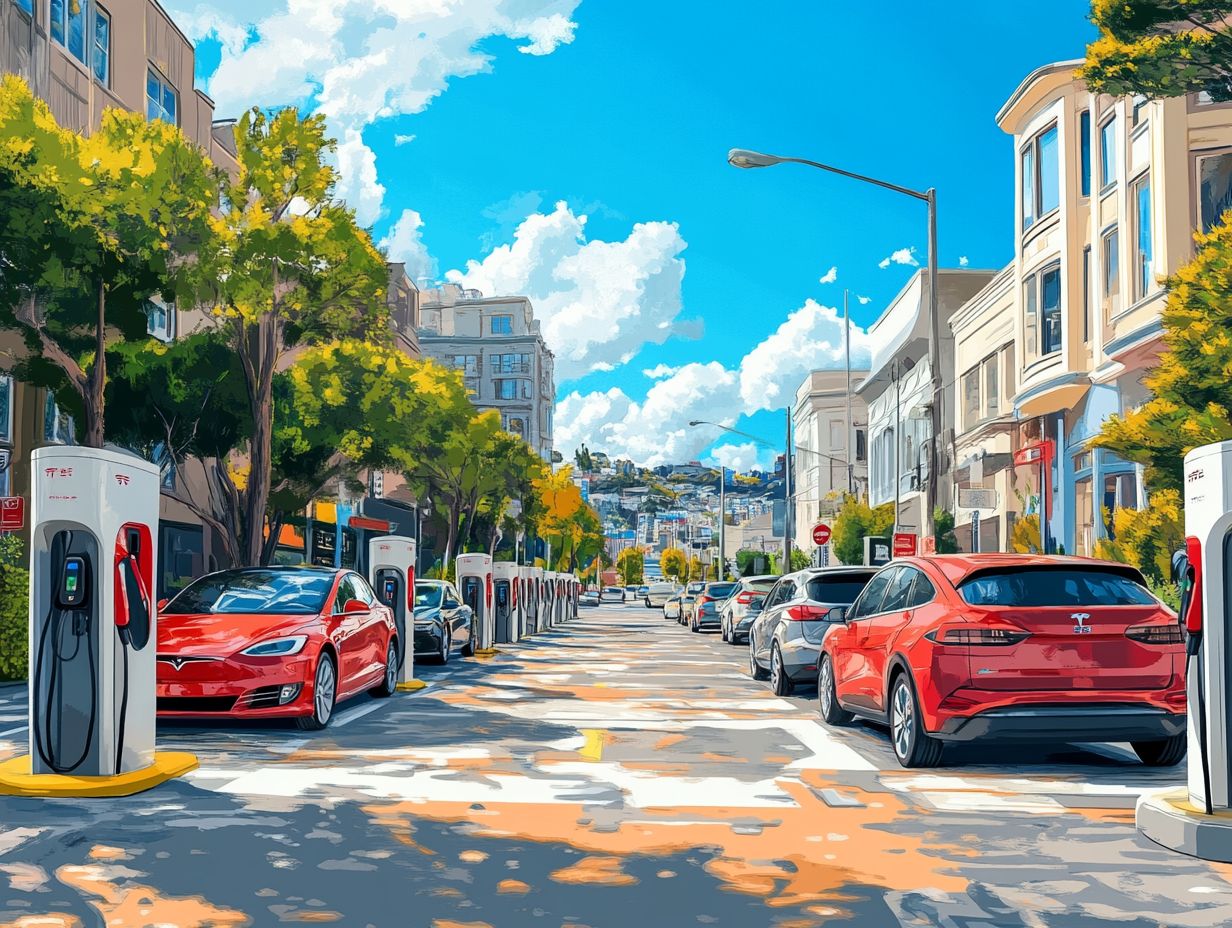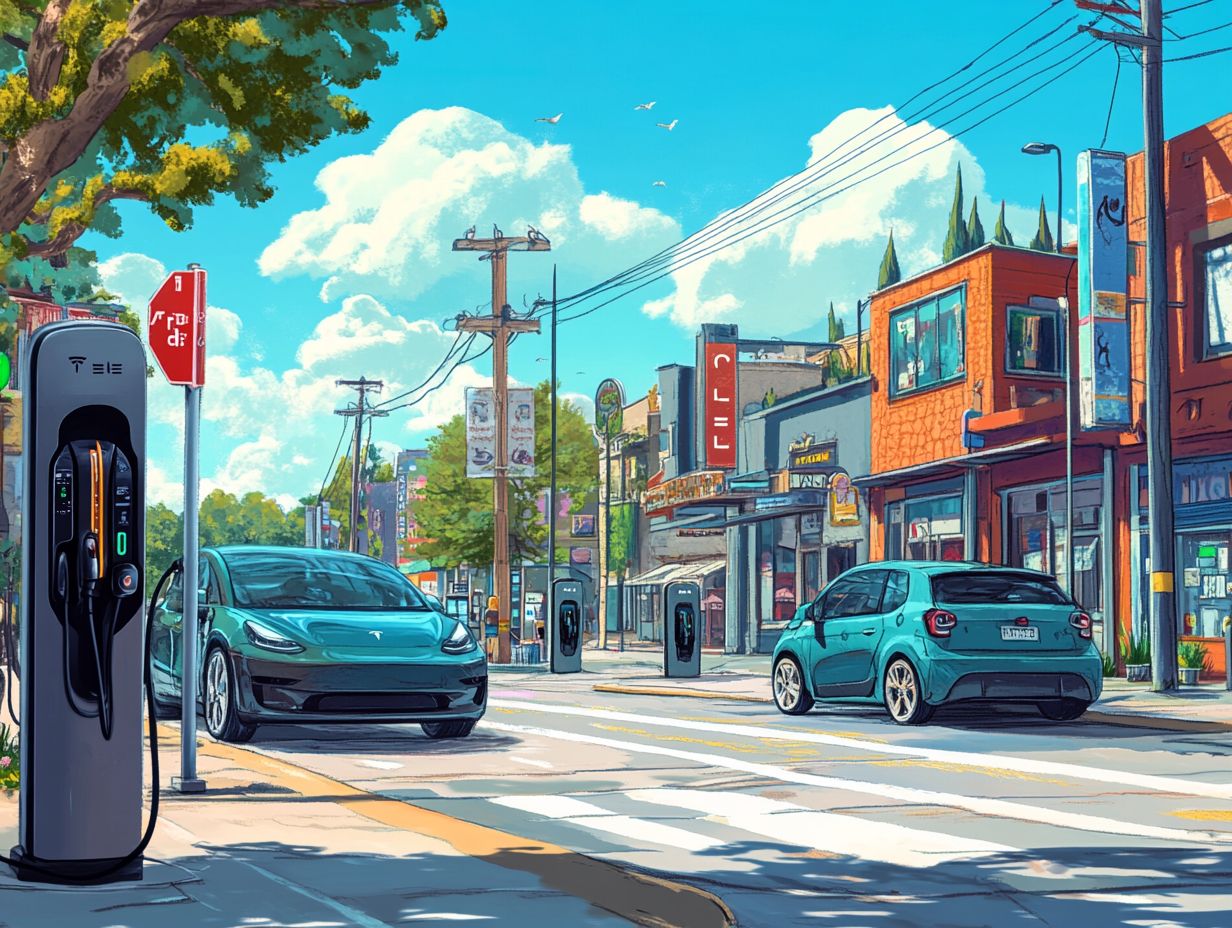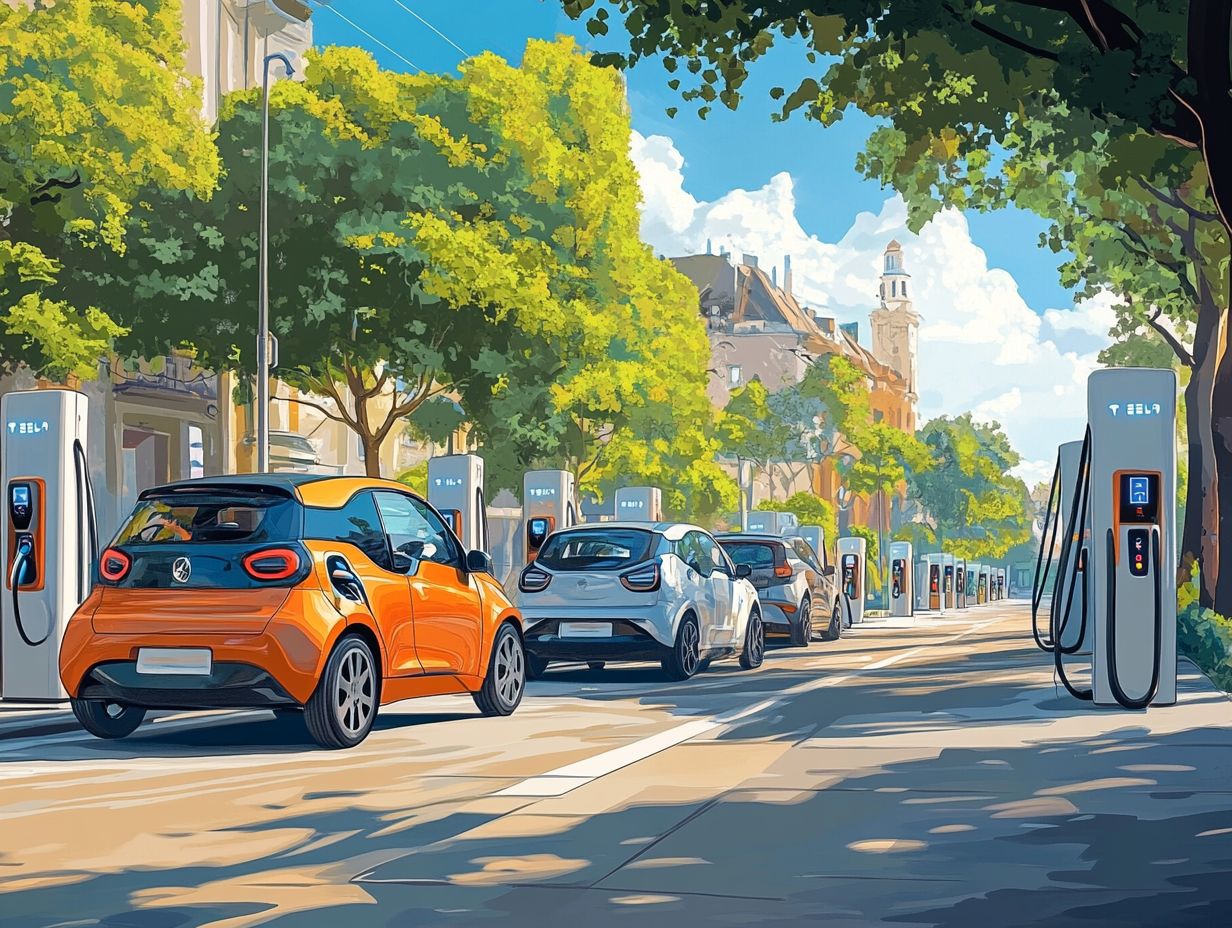How EVs are Influencing Global Oil Markets
Electric vehicles (EVs) are not merely changing the automotive landscape; they are also redefining the global oil markets.
As you delve into the definition and types of EVs, consider how their increasing popularity is reshaping oil demand and influencing prices. Environmental concerns and government incentives are driving this significant shift, yet challenges such as infrastructure and costs linger on the horizon.
This article explores what EVs are, the various types available, and their crucial role in promoting environmental sustainability and paving the way for a cleaner energy future.
Contents
- Key Takeaways:
- Overview of Electric Vehicles (EVs)
- Impact of EVs on Global Oil Markets
- Factors Driving the Growth of EVs
- Challenges for EV Adoption
- The Future of EVs and Oil Markets
- Frequently Asked Questions
- How are EVs influencing global oil markets?
- What specific changes are being seen in global oil markets due to EVs?
- Are EVs the main reason for declining oil prices?
- How is the oil industry responding to the rise of EVs?
- Is the rise of EVs a threat to the oil industry?
- How are countries with heavy reliance on oil exports being affected by the rise of EVs?
Key Takeaways:

- EVs are defined as vehicles that run on electricity instead of traditional fossil fuels, with various types including battery electric, plug-in hybrid, and fuel cell vehicles.
- The rise of EVs is causing a decrease in global oil demand and influencing changes in oil prices. This is due to their use of electricity as a cleaner and more efficient alternative to oil.
- The growth of EVs is mainly driven by environmental concerns and government policies and incentives, as countries aim to reduce emissions and promote sustainable transportation.
Overview of Electric Vehicles (EVs)
Electric Vehicles (EVs) are transforming the transportation landscape, presenting a cleaner alternative to traditional gasoline-powered cars. Countries are excitedly pursuing climate targets to lessen their dependence on fossil fuels, and we are witnessing a remarkable surge in the adoption of electric vehicles.
This shift is fueled by innovations in battery technology, enticing government incentives, and evolving consumer attitudes towards renewable energy.
Definition and Types of EVs
Electric vehicles (EVs) are defined as vehicles that use electric motors to move, primarily powered by batteries. The most common type is the battery electric vehicle (BEV).
Battery electric vehicles operate exclusively on electric energy stored in lithium-ion batteries, offering zero emissions and lower operating costs compared to traditional gasoline cars.
If you re looking for flexibility, plug-in hybrid electric vehicles (PHEVs) combine electric motors with an internal combustion engine, allowing you to switch between electricity and gasoline, effectively extending your driving range.
On the other hand, hybrid vehicles use both systems but don t require external charging, making them a practical option for those who are not ready to fully embrace electric driving. Each type of EV plays a vital role in the energy transition, promoting sustainability and reducing reliance on fossil fuels while catering to your diverse needs as a consumer.
Impact of EVs on Global Oil Markets
The rise of electric vehicles (EVs) is fundamentally transforming global oil markets by substantially changing oil demand and consumption patterns. As the transportation sector moves towards electrification, you can expect a reduction in reliance on fossil fuels.
This shift urgently compels oil companies to reassess their strategies in light of evolving consumer preferences and increasingly stringent emissions regulations. The International Energy Agency suggests that the ascent of EVs may result in a significant decrease in global oil consumption, impacting everything from oil prices to production targets.
Reduction in Oil Demand
The rise of electric vehicles (EVs) is changing oil demand. More people are choosing cleaner alternatives to fossil fuels.
By 2030, EV adoption could replace about 4 million barrels of oil per day, transforming global energy consumption. This shift signals a move toward sustainable energy sources and pressures fossil fuel industries to adapt.
As governments worldwide implement stricter emissions regulations and roll out incentives for electric vehicles, the impact on oil revenues is a hot topic right now. Analysts predict that reliance on oil will wane, paving the way for a new era of cleaner energy and reshaping market dynamics in ways that will affect us all.
Changes in Oil Prices

The rise in electric vehicle adoption is driving significant changes in oil prices. This is largely due to shifts in global oil consumption patterns and the ongoing energy transition.
As more people choose electric options, the traditional demand for gasoline and diesel is diminishing. This puts pressure on oil markets to adapt. International initiatives aimed at combating climate change are intensifying this trend, as countries prioritize sustainable energy sources.
In response, oil-exporting nations are reevaluating their production levels and pricing strategies to align with these evolving preferences. Market participants are closely watching how economic policies, including subsidies for green technologies and emissions regulations, influence the balance of supply and demand. These factors are pivotal in shaping future oil prices.
Factors Driving the Growth of EVs
The rise of electric vehicles can be traced to a compelling mix of factors. Heightened environmental concerns have sparked an interest in sustainable options, while supportive government policies create a favorable landscape for adoption.
Technological advancements are also driving market acceptance, making EVs an increasingly attractive choice for discerning individuals.
Environmental Concerns
Environmental concerns significantly drive interest in electric vehicles. As members of the community, we recognize the urgency to combat climate change and reduce emissions through energy that comes from natural processes, like sunlight and wind.
This shift toward electric vehicles represents a commitment to environmental sustainability. These advanced modes of transportation offer a much greener alternative to traditional gasoline-powered cars. By reducing reliance on fossil fuels, electric vehicles play a crucial role in lowering greenhouse gas emissions, which significantly contribute to global warming.
With ongoing technological innovations, the efficiency and performance of electric vehicles are continually improving, making them even more appealing.
These developments reflect a deep understanding of the urgent need for action against climate change and highlight the positive impact of embracing sustainable technologies in the automotive industry.
Government Policies and Incentives
Government policies and incentives are essential in fostering the adoption of electric vehicles (EVs). Initiatives from organizations like the Environmental Protection Agency enhance consumer perceptions of cleaner transportation options.
State and local governments offer tax credits, rebates, and grants, encouraging you to view EVs as a viable alternative for your transportation needs. These financial incentives reduce your purchase price and lead to long-term savings through lower fuel and maintenance costs.
The development of charging infrastructure, often supported by government funding, helps alleviate any range anxiety you may feel about switching to an EV. Policies that promote renewable energy integration also enhance the appeal of electric vehicles, creating an image of sustainability and efficiency that resonates with your environmentally conscious mindset.
In essence, these measures shift market dynamics, driving increased competition and innovation within the automotive industry to better serve your preferences.
Challenges for EV Adoption
Despite the numerous benefits that electric vehicles (EVs) offer, significant challenges stand in the way of their widespread adoption. These hurdles include insufficient infrastructure, range anxiety, and the high costs associated with the limited availability of consumer-friendly models in the market.
Infrastructure and Range Anxiety

Infrastructure development plays an important role in your journey toward embracing electric vehicles (EVs). A lack of charging stations fuels range anxiety among potential consumers like you.
This fear comes from worrying about running out of battery power during a trip, making it tough for you to consider moving away from conventional gasoline vehicles. Enhancing EV charging infrastructure can alleviate these concerns, allowing you to trust that you can recharge conveniently wherever you go.
The importance of integrating fast-charging stations in strategic locations like shopping centers and highways cannot be underestimated. This integration significantly reduces travel time and elevates your overall experience.
When both public and private sectors invest in these networks, it demonstrates a strong commitment to sustainability. This resonates with your environmentally conscious values and boosts the appeal of electric vehicles in the market.
Cost and Availability of EVs
The cost and availability of electric vehicles (EVs) pose significant barriers to your entry into the market. High battery costs and a limited selection of models might make you think twice before making that purchase.
Yet, there s a silver lining: advancements in battery technology are redefining this industry. Innovations that lower production costs and enhance energy density can lead to more affordable prices for you, ultimately strengthening the case for wider adoption.
As competition heats up among manufacturers, a richer variety of models is emerging, catering to a range of customer preferences. This convergence of factors affects the affordability of electric vehicles and shapes your decision-making process, creating a vibrant environment for greener transportation options.
The Future of EVs and Oil Markets
The future of electric vehicles (EVs) and oil markets is on the brink of substantial transformation. Predictions suggest a remarkable surge in EV sales, driven by global climate commitments and a dedicated move toward renewable energy sources. Act now to take advantage of these benefits!
Predictions and Projections
Exciting forecasts show that electric vehicles (EVs) are set to change the game, causing oil demand to decline steadily. This shift is backed by credible data from the International Energy Agency.
Recent studies indicate that by 2030, EV sales could represent up to 30% of total vehicle sales worldwide. This trend is prompting a significant shift in energy consumption patterns.
As electric vehicles continue to gain traction, they are expected to directly influence oil consumption, with projections highlighting a reduction of several million barrels per day.
With more consumers choosing electric cars, the fossil fuel industry may grapple with less need for oil. Additionally, companies may face the imperative to adapt to a swiftly evolving marketplace. These dynamics have the potential to redefine the global energy landscape, compelling companies to invest more heavily in renewable energy sources and technologies that resonate with emerging market demands.
Frequently Asked Questions
How are EVs influencing global oil markets?

As EVs gain popularity and the demand for gasoline decreases, there is a direct impact on global oil markets. This is because EVs do not require gasoline, a major component of the oil industry. Understanding the effect of EVs on energy demand and supply is crucial in this shifting landscape.
What specific changes are being seen in global oil markets due to EVs?
One major change is the decrease in demand for gasoline and other petroleum products used in transportation. This has caused a shift in traditional oil market dynamics, leading to lower prices and changes in production and consumption patterns.
Are EVs the main reason for declining oil prices?
The rise of EVs plays a big role in lowering oil prices, but other factors like higher production and changing global politics also matter. However, the rise of EVs is expected to have a long-term impact on oil prices.
How is the oil industry responding to the rise of EVs?
The oil industry is taking notice of the increasing popularity of EVs. Some companies are investing in renewable energy sources, while others are diversifying their products to include EV charging stations and other sustainable solutions.
Is the rise of EVs a threat to the oil industry?
While EVs are certainly disrupting the traditional oil market, it is not necessarily a threat to the industry. Oil will still be needed for other purposes, such as the production of plastics and other materials. However, the industry faces pressure to adapt and find new ways to remain relevant in a changing market.
How are countries with heavy reliance on oil exports being affected by the rise of EVs?
Countries that heavily rely on oil exports for their economy are feeling the impact of the rise of EVs. As demand for gasoline decreases, these countries face challenges in diversifying their economies and finding new sources of revenue. This has led to discussions and initiatives to transition to more sustainable and diverse economies.
Curious about the future of energy? Stay tuned for updates on electric vehicles and their role in transforming our world!






